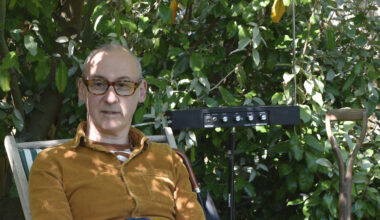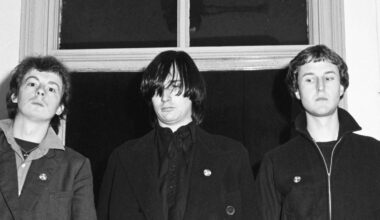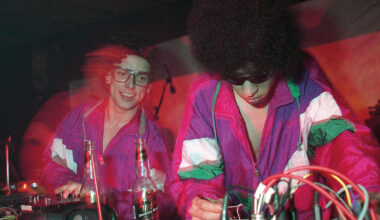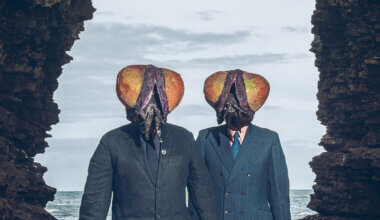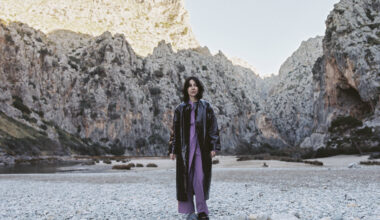How do you define ambient music? What’s the role of ambient today? And how might it sound in the future? We put these questions and others to our esteemed panel of ambient artists
Meet The Panel
Adam Wiltzie
Feted for his ethereal and atmospheric soundscapes, Wiltzie is best-known for his pioneering drone/ambient projects Stars Of The Lid (with Brian McBride), A Winged Victory For The Sullen, The Dead Texan and Aix Em Klemm. He has also written several original scores for film and television, including collaborations with the likes of Jóhann Jóhannsson and Dustin O’Halloran.
Wolfgang Voigt
Producer, DJ and co-founder of iconic Cologne electronic/techno label Kompakt, Wolgang Voigt has released music under countless aliases but he is most renowned for the dense, hypnotic sounds he creates as GAS. In 2019, he was awarded the “Holger Czukay Preis für Popmusik” – a prize recognising exceptional achievements, named after Can’s legendary bassist – for his influential work.
Alex Paterson
As co-founder of ambient house trailblazers The Orb in 1988 – with Jimmy Cauty – Paterson achieved massive success with 1991’s landmark ‘The Orb’s Adventures Beyond The Ultraworld’, and has continued to fly the Orb flag ever since, working with various collaborators. Their latest studio album ‘Prism’ was released last year to considerable acclaim.
Marta Salogni
Award-winning artist, producer, engineer and mixer, Marta Salogni has worked with the likes of Depeche Mode, Björk, Holly Herndon, Lucrecia Dalt and a host of others. Granted the accolade of UK Music Producer Of The Year in 2022, she frequently performs live with tape machines, and runs the Free Youth Orchestra charity, giving children greater access to musical instruments and lessons.
Lawrence English
The prolific Australian composer and self-confessed “philosopher of listening” works across various eclectic “aesthetic investigations”. A serial collaborator, he’s previously hooked up with artists such as William Basinski, Alessandro Cortini, Loscil, David Toop, Scanner and Lea Bertucci, to name just a few, and is also the founder of experimental label Room40.
Phew
Japanese vocalist and electronic/post-punk innovator Phew (aka Hiromi Moritani) started out fronting avant/punk/psych group Aunt Sally in the late 1970s. Having worked with Ryuichi Sakamoto, Can, DAF and others, she’s also cultivated a rich and varied solo career. Her self-titled 1981 album, recorded with Jaki Liebezeit and Holger Czukay, was engineered by the legendary Conny Plank, while her key 1992 long-player ‘Our Likeness’ was reissued last year on Mute.
KMRU
A beacon of ambient and field recording experimentalism, KMRU (Kenyan sound artist Joseph Kamaru) has performed across the world. Having enrolled on a Sound Studies and Sonic Arts programme at Berlin’s prestigious Universität der Künste (UDK), he’s released work on Warp and Editions Mego, and his most recent album, 2023’s ‘Dissolution Grip’, came out on his own OFNOT label.
Marta De Pascalis Drawing on ambient, Berlin School and psych tropes, the solo work of Italian sound designer and synthesist De Pascalis is rooted in tape loops, spontaneous improv and repetitive patterns, often to beguiling effect. Based in Berlin, her latest album ‘Sky Flesh’, a labyrinthine gem of emotion, narrative and mystery, was released last year on Caterina Barbieri’s Light-years label.
What does ambient music mean to you?
Wolfgang Voigt: “Ambient is a promise, that beyond mediocrity there is something where calmness reigns. Ambient calms the nerves. It is not an intention but a fact, rigour, responsibility. Ambient is attitude, grandeur, splendour.”
Alex Paterson: “It’s the beginning of a movement that became ambient house. It means the world to me… it was something we developed as The Orb and it became the template for a few of our albums and remixes for other musicians, like YMO and Front 242.”
Marta Salogni: “Ambient music paints a landscape, whether real or abstract, and sings about its forms, allowing us to be transported and immersed in that new environment or state of mind.”
Phew: “Music that can be listened to from anywhere, can be stopped anywhere, and resonates comfortably in a room.”
Lawrence English: “For me, as a listener and as a musician, ambient is a music of lived moments. It’s porous and evolving, a music that hangs in the air as much as it is an atmosphere in itself.”
KMRU: “I think I find myself in and out of this ambient cliche genre tag! Although being aware that most of my music fits in this category, ‘ambient’ music for me is about listening for the sublime… the unsettling ambivalence.”
Marta De Pascalis: “A music genre characterised by a focus on specific sound aspects, stripped to its core, mostly contemplative and meditative. The way that is then soaked into many other music genres, shaping their distinctive features, is something that I find really interesting.”
Favourite all-time ambient album or track?
Adam Wiltzie: “Brian Eno’s ‘Thursday Afternoon’. Although this one is 10 years after ‘Discreet Music’, I reckon it’s the one I have fallen asleep to the most.”
Wolfgang Voigt: “I wouldn’t name any favourites – this leads to irritation and misunderstandings. For decades, groundbreaking ambient albums have been released that have made the world a better place. And there were so many published that didn’t.”
Marta De Pascalis: “One of the ambient records that struck me back in the day was ‘Substrata’ by Biosphere – I loved the distinctive glacial moods. Or ‘Rainbow Dome Musick’ by Steve Hillage, which I used to play a lot for going to sleep after parties. But I have never been a great ambient digger. I’ve always much preferred kosmische, soundtrack and library music, or electronic, rock and sonic experimentations with ambient influences, rather than strict ambient per se.”
Lawrence English: “Wow, not a hard task or anything! If I was to name a piece of music that I have listened to a great deal, and that has brought a sense of atmosphere to the most un-atmospheric places – planes, for instance – then perhaps Donnacha Costello’s ‘Dry Wretch’ could qualify. But I have so many other examples that I could give.”
Phew: “Brian Eno’s ‘Music For Airports’. It introduced the concept of ambient to me, which led me to listen to the work of Obscure Records. I have a personal attachment to it because I made my first album in 1980, in the same studio where it was recorded, via the airport where the idea for the album was born.”
Marta Salogni: “‘Prati Bagnati Del Monte Analogo’ by Raul Lovisoni and Francesco Messina. It gives me a special inner peace, and reminds me of looking at the lake where I was born in Northern Italy at night, with the lights reflecting and trembling on its waters.”
KMRU: “Hard to pick one, but I have a soft spot for Klara Lewis’ ‘Ingrid’ track, released on Editions Mego.”
Alex Paterson: “Manuel Göttsching’s ‘E2-E4’.”

Best thing about contemporary ambient music?
Lawrence English: “What I respect most about ambient music, from any period, is its invitation to lean in. My favourite ambient works are an encouragement to listen, at all levels. That’s not always happening simultaneously, of course, but any work that affords a multiplicity of engagement I hold very highly.”
Phew: “I don’t listen to music with an awareness of its production date, so I don’t know what ambient music is like today. I marvel at the delicacy of expression, perhaps because digital technology has made it possible to produce sound-like etchings with the precision of a copperplate print.”
Alex Paterson: “It’s not dead. And it’s not all about The KLF.”
Adam Wiltzie: “I am not going to blow smoke up ambient music’s posterior. Some techniques have evolved in a certain way but the underlying concept – at least emotionally – still feels much the same. If you look at a Winged Victory For The Sullen song I wrote recently, it could have been on a Stars Of The Lid recording 20 years ago. It would be a tragic waste of words to put one of these recordings on a higher level than the other. I would maybe argue the listener has changed much more than the creator.”
Marta Salogni: “We have new instruments and technologies which allow us to make music with even deeper sounds, and more vivid colours and nuances. Use all the frequencies and push all the dynamics like never before.”
KMRU: “I think ambient is progressing in different forms, and it’s fascinating to see. The community is small and there’s always support for artists making ambient music.”
Wolfgang Voigt: “One of the best things about ambient, as I see it, is that it’s not contemporary but timeless. I don’t follow ambient in the sense of current events. Ambient either happens or it doesn’t.”
Marta De Pascalis: “I don’t really know, to be honest. Sometimes I do research for mixtapes or DJ sets – I listen to new ambient releases and most of the time I find it too obvious for my taste, so I end up picking other stuff. Maybe I find ambient music today too predictable, but probably not because it actually is – mostly because it isn’t what I crave.”
Most annoying ambient cliche?
Marta Salogni: “The most ridiculous cliches are that ambient music might lack composition, structure or melody, and that it is music that often exists ‘in the background’, but that could not be further from the truth. Ambient music can be profoundly radical, all-enveloping, potent, and hardly fits into the rules we often like to box it in.”
Lawrence English: “An assumption that ambient music’s enemy is noise. They are comrades.”
Wolfgang Voigt: “Muzak. Furniture shops. Floatation tanks. Music for airports…”
KMRU: “The soothing nature and ‘wellbeing’ of ambient music and reverbs. There’s lots of good ambient music which isn’t exploratory [enough], as it lingers in the cliche of what ambient music is or should be.”
Marta De Pascalis: “Confusing any beatless music with ambient is something I find super-annoying. I don’t like to label my music as ambient, as I think it’s very reductive. Some tracks are certainly ambient, but most of them are more experimental, electronic.”
Alex Paterson: “Who killed ambient noises?”
What should you never hear on an ambient record? We’re thinking whale sounds…
Lawrence English: “But cetaceans are so great! Perhaps uncalculated dynamism?”
KMRU: “Long, shimmery, decaying reverbs.”
Phew: “The sound of waves or running water. It’s simply a matter of taste, but I feel less uncomfortable if I hear concrete sounds.”
Wolfgang Voigt: “Ambient is resilient and open. There are no rules for ambient music, except that it regulates itself.”
Marta Salogni: “I’m not the kind of person who likes limitations in music, so whatever inspires and is meaningful to the artist and audience can and should be used freely without fear.”
Alex Paterson: “Thrash metal and nasty, deep feedback.”
Marta De Pascalis: “I don’t really feel like I would veto anything. With technology, we can process any sound – even a whale sound – over and over, transform it into something completely unrecognisable, and make an ambient track with it. Sound-wise, I like to be surprised, although I’m more of a synth-obsessed purist.”
In these anxious times, what is the role of ambient music?
KMRU: “Maybe a reflection on what’s happening, and opening new ways of thinking… allowing discomfort in the sublime.”
Wolfgang Voigt: “For me, ambient is not just the soundtrack of consolation against the stupidity of the world. Ambient has no role and no obligation.”
Alex Paterson: “Chill, drop in and flop out, sisters and brothers.”
Marta Salogni: “Kafka said that ‘a book must be the axe for the frozen sea within us’. I like to think the same about ambient music.”
Lawrence English: “All music serves a vital role for those making and those listening. I think there’s a danger in reducing work to ‘functionalism’, which perhaps is something that’s haunting ambient right now. Culturally, reductive reads of work are rarely of value – it’s for us to push at the boundaries of the practice, to open and deepen it further.”
Marta De Pascalis: “I guess quite a lot of people use ambient for relaxation and meditation – I use it myself for yoga home sessions. But as a remedy for anxiety, I personally find more relief in going to see a great punk band – that’s more the kind of music energy that puts me at peace.”
Phew: “In a world of dichotomies, something as ambiguous as ambient music, which cannot be clearly categorised, is essential – even if it plays no role.”
Where do you see ambient music going in the future?
Adam Wiltzie: “Normally, my response to this question is that what I create is so nuanced, it would be almost impossible to recreate, especially in terms of recording processes and textures and sounds. But with AI, I am not so sure anymore. To thicken the plot, on Stars Of The Lid’s Spotify page there are new recordings posted at least two or three times a year. The music is not SOTL and does not sound like SOTL, but I’m not sure others seem to care. A colleague has claimed this is some sort of AI created by Spotify, posting new releases on random artist accounts that have tens of millions of streams, so as to create more revenue for the company.”
Alex Paterson: “Way past our lifetimes and into the 23rd century.”
Wolfgang Voigt: “Here.”
Marta Salogni: “As we widen our experiences, the music we will make will reflect that. We will write and record new landscapes, and invent new sounds that can paint even more complex compositions.”
KMRU: “I feel there’ll be an amalgamation of all sorts of styles.”
Marta De Pascalis: “Given ambient’s contemplative nature, it is possible that it takes a fully functional turn in the direction of ‘empty formalism’, to quote the title of Brian Eno’s 2018 installation, that I saw in Berlin. Something that aims to facilitate individual experiences rather than embodying them. But maybe it has always been like that.”
Phew: “Ambient music should not have any direction – it should remain ambiguous and incomplete.”
Lawrence English: “I truly hope its orbit drifts farther and farther away from the centre. The fringes hold the key to fulfilment.”

